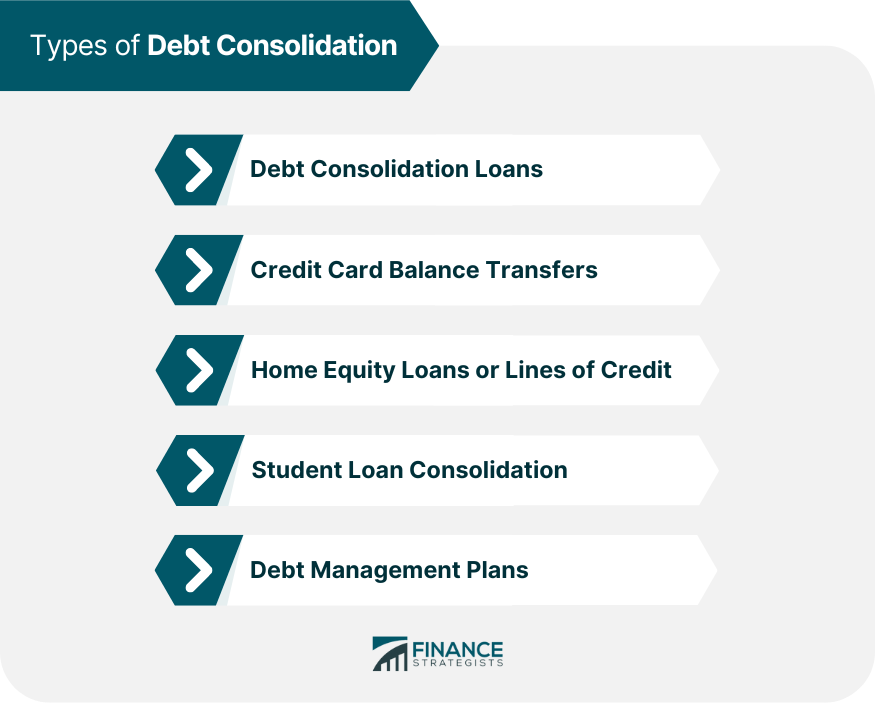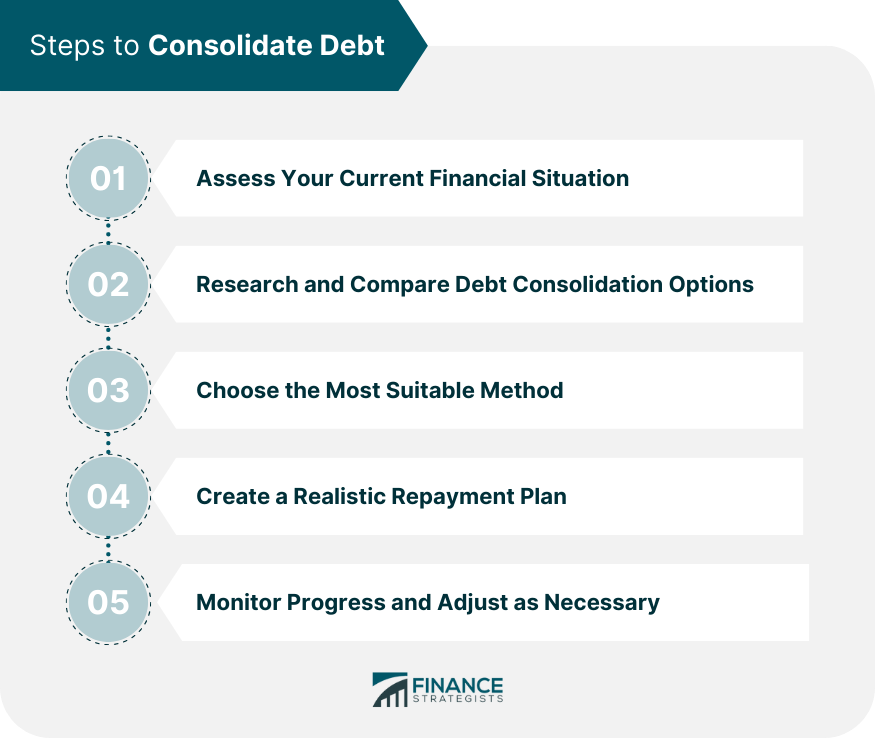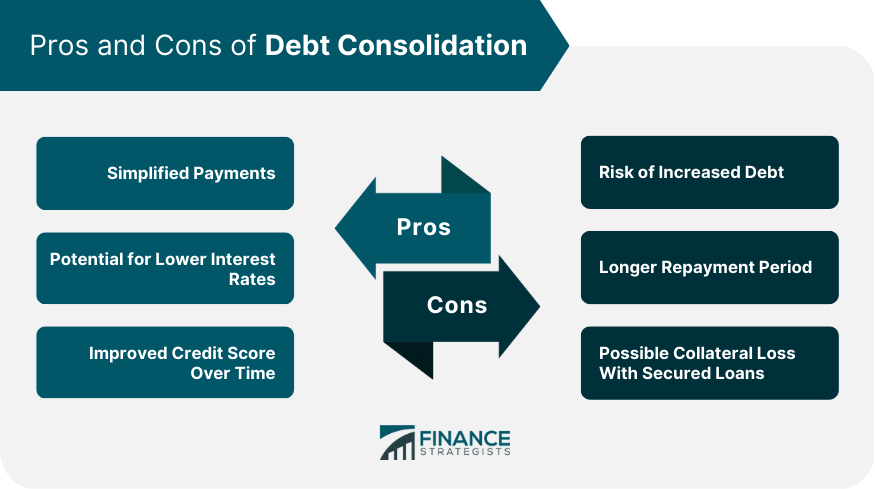Debt consolidation is a financial strategy that involves combining multiple debts into a single, more manageable payment. This method can simplify the repayment process, potentially reduce interest rates, and help borrowers regain control of their finances. Debt consolidation is often considered by individuals with high-interest debt from multiple sources, such as credit cards, personal loans, or student loans. There are several ways to consolidate debt, each with its own advantages and disadvantages. Understanding these options can help you determine the best solution for your financial situation. Debt consolidation loans are a common method of consolidating debt. There are two main types: Secured loans require collateral, such as a home or vehicle, which can be seized by the lender if the borrower defaults on the loan. These loans typically offer lower interest rates but pose a higher risk to borrowers due to the potential loss of collateral. Unsecured loans do not require collateral, making them less risky for borrowers. However, they often come with higher interest rates due to the increased risk for lenders. A balance transfer involves moving high-interest credit card debt to a new card with a lower interest rate. This can help reduce interest costs and simplify payments. It is essential to consider the balance transfer fee and the promotional interest rate's duration before choosing this option. Homeowners can use their home's equity to secure a loan or line of credit to consolidate debt. These options usually offer lower interest rates but involve the risk of losing your home if you default on payments. Federal student loans can be consolidated into a single loan with a fixed interest rate. This option simplifies repayment and may lower monthly payments, but it can also extend the repayment period, increasing the total amount paid over time. Debt management plans are offered by credit counseling agencies. They involve negotiating with creditors to reduce interest rates and fees, creating a more manageable repayment plan. These plans typically require a monthly fee paid to the credit counseling agency. Before consolidating debt, it's crucial to evaluate several factors that can impact your financial situation: Consider the total amount of debt you owe and whether consolidating will help you pay it off more efficiently. Compare the interest rates of your current debts to the consolidation option you are considering. Consolidation can be beneficial if it results in a lower overall interest rate. Review the loan terms and repayment period to ensure that you can manage the new payment schedule and understand the total cost of the loan over time. Debt consolidation can affect your credit score, both positively and negatively. Ensure you understand the potential impact before moving forward. Consider any fees or additional costs associated with debt consolidation, such as origination fees, balance transfer fees, or closing costs. Follow these steps to effectively consolidate your debt: Take a detailed look at your income, expenses, and outstanding debts to understand your financial standing. Explore different debt consolidation methods and compare their interest rates, fees, and terms to find the most suitable option for your situation. Select the debt consolidation option that best aligns with your financial goals and capabilities. Develop a repayment plan that fits within your budget and helps you pay off your debt as efficiently as possible. Regularly review your financial situation, track your progress, and make any necessary adjustments to stay on track with your debt repayment goals. It's essential to weigh the advantages and disadvantages of debt consolidation before making a decision. Simplified Payments: Consolidation can streamline debt repayment by combining multiple payments into one. Potential for Lower Interest Rates: Consolidating debt may result in a lower overall interest rate, saving you money over time. Improved Credit Score Over Time: Timely payments and reduced credit utilization can improve your credit score. Risk of Increased Debt: Consolidation can create a false sense of financial relief, leading to additional spending and increased debt. Longer Repayment Period: Consolidation loans may have longer repayment terms, resulting in a longer time spent in debt and potentially higher total interest costs. Possible Collateral Loss With Secured Loans: If you choose a secured loan, such as a home equity loan, you risk losing your collateral if you default on payments. If debt consolidation is not the right solution for your financial situation, consider these alternatives: Credit counseling agencies can provide guidance on budgeting, debt management, and financial planning to help you regain control of your finances. Debt settlement involves negotiating with creditors to reduce the total amount of debt owed. This option can negatively impact your credit score but may provide relief for those struggling with significant debt. Bankruptcy is a legal process that can eliminate or restructure certain debts. While it can provide a fresh financial start, bankruptcy has severe and long-lasting consequences on your credit and financial reputation. Implementing do-it-yourself debt reduction strategies, such as the debt snowball or avalanche methods, can help you take control of your finances without the need for professional intervention. Debt consolidation is a financial strategy that involves combining multiple debts into a single, more manageable payment. There are several ways to consolidate debt, each with its own advantages and disadvantages. Debt consolidation loans, credit card balance transfers, home equity loans or lines of credit, student loan consolidation, and debt management plans are some of the types of debt consolidation. Before consolidating debt, it's crucial to evaluate several factors that can impact your financial situation, such as total outstanding debt, interest rates, loan terms and repayment period, credit score impact, and fees and additional costs. It is also essential to weigh the advantages and disadvantages of debt consolidation before making a decision. Alternatives to debt consolidation include credit counseling, debt settlement, bankruptcy, and DIY debt reduction strategies. Following a realistic repayment plan and monitoring progress and adjusting as necessary are crucial steps to consolidate debt effectively.Definition of Debt Consolidation
Types of Debt Consolidation

Debt Consolidation Loans
Secured Loans
Unsecured Loans
Credit Card Balance Transfers
Home Equity Loans or Lines of Credit
Student Loan Consolidation
Debt Management Plans
Factors to Consider Before Consolidating Debt
Total Outstanding Debt
Interest Rates
Loan Terms and Repayment Period
Credit Score Impact
Fees and Additional Costs
Steps to Consolidate Debt
Assess Your Current Financial Situation
Research and Compare Debt Consolidation Options
Choose the Most Suitable Method
Create a Realistic Repayment Plan
Monitor Progress and Adjust as Necessary

Pros and Cons of Debt Consolidation
Pros
Cons

Alternatives to Debt Consolidation
Credit Counseling
Debt Settlement
Bankruptcy
DIY Debt Reduction Strategies
Conclusion
Debt Consolidation FAQs
Debt consolidation is a financial strategy that combines multiple debts into a single, more manageable payment. It can simplify the repayment process, potentially reduce interest rates, and help borrowers regain control of their finances.
Common debt consolidation options include debt consolidation loans (secured and unsecured), credit card balance transfers, home equity loans or lines of credit, student loan consolidation, and debt management plans.
Debt consolidation can have both positive and negative effects on your credit score. Timely payments and reduced credit utilization can improve your score, but applying for new loans or lines of credit and closing old accounts may temporarily lower your score.
Before consolidating debt, consider factors such as total outstanding debt, interest rates, loan terms and repayment period, credit score impact, and any fees or additional costs associated with the consolidation option.
Yes, alternatives to debt consolidation include credit counseling, debt settlement, bankruptcy, and DIY debt reduction strategies, such as the debt snowball or avalanche methods. It's essential to carefully evaluate your financial situation and goals before selecting the best approach for managing your debt.
True Tamplin is a published author, public speaker, CEO of UpDigital, and founder of Finance Strategists.
True is a Certified Educator in Personal Finance (CEPF®), author of The Handy Financial Ratios Guide, a member of the Society for Advancing Business Editing and Writing, contributes to his financial education site, Finance Strategists, and has spoken to various financial communities such as the CFA Institute, as well as university students like his Alma mater, Biola University, where he received a bachelor of science in business and data analytics.
To learn more about True, visit his personal website or view his author profiles on Amazon, Nasdaq and Forbes.











